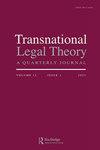“新的规范架构”——风险和恢复力是联合国治理的常规
Q2 Social Sciences
引用次数: 3
摘要
我们的贡献描述了国际法授权的治理实践的可理解性的重新定位。观察世界银行,我们叙述了新的管理态度和组织惯例,表现出增强的“风险偏好”。风险和复杂性不再被视为制度项目的限制条件,而是作为共同构成要素和建设性工具,包括旨在通过偶然性和不可知进行管理的新启发式集合。我们观察到的实践具有自适应、迭代和递归的特点,灵活地适应内在的可能性和弹性的目标。我们将这些变化置于治理的谱系中,重点关注与“剩余生命”的关系,或人口中不守规矩的因素,这些因素持续地逃避生产性结合到机构计划的关闭中。世界银行将弹性作为改革的一种特殊合理性,标志着一种制度性的尝试,即吸纳那些在确定的制度性干预中逃脱的因素。本文章由计算机程序翻译,如有差异,请以英文原文为准。
‘A new normative architecture’ – risk and resilience as routines of un-governance
ABSTRACT Our contribution describes a reorientation in the intelligibility of governance practices authorised under international law. Observing the World Bank, we narrate new managerial attitudes and organisational routines that exhibit heightened ‘risk appetites’. Risk and complexity are no longer seen as limiting conditions on the institutional project, but as co-constitutive elements and constructive tools, including new sets of heuristics aimed at governing with and through contingency and unknowability. The practices that we observe are characterised by adaptive, iterative and recursive routines, flexibly attuned to immanent possibilities and aims of resilience. We situate these changes in a genealogy of governmentality, focusing on the relation to a ‘surplus of life’, or unruly elements of populations that persistently escape productive incorporation into the closure of institutional programmes. The World Bank’s turn to resilience as a particular rationality of reform signals an institutional attempt to enrol what has escaped prior efforts at determinate institutional intervention.
求助全文
通过发布文献求助,成功后即可免费获取论文全文。
去求助
来源期刊

Transnational Legal Theory
Social Sciences-Law
CiteScore
2.10
自引率
0.00%
发文量
7
期刊介绍:
The objective of Transnational Legal Theory is to publish high-quality theoretical scholarship that addresses transnational dimensions of law and legal dimensions of transnational fields and activity. Central to Transnational Legal Theory''s mandate is publication of work that explores whether and how transnational contexts, forces and ideations affect debates within existing traditions or schools of legal thought. Similarly, the journal aspires to encourage scholars debating general theories about law to consider the relevance of transnational contexts and dimensions for their work. With respect to particular jurisprudence, the journal welcomes not only submissions that involve theoretical explorations of fields commonly constructed as transnational in nature (such as commercial law, maritime law, or cyberlaw) but also explorations of transnational aspects of fields less commonly understood in this way (for example, criminal law, family law, company law, tort law, evidence law, and so on). Submissions of work exploring process-oriented approaches to law as transnational (from transjurisdictional litigation to delocalized arbitration to multi-level governance) are also encouraged. Equally central to Transnational Legal Theory''s mandate is theoretical work that explores fresh (or revived) understandings of international law and comparative law ''beyond the state'' (and the interstate). The journal has a special interest in submissions that explore the interfaces, intersections, and mutual embeddedness of public international law, private international law, and comparative law, notably in terms of whether such inter-relationships are reshaping these sub-disciplines in directions that are, in important respects, transnational in nature.
 求助内容:
求助内容: 应助结果提醒方式:
应助结果提醒方式:


